口译资料:二十国集团金融市场和世界经济峰会的宣言
国际贸易词汇+口译练习
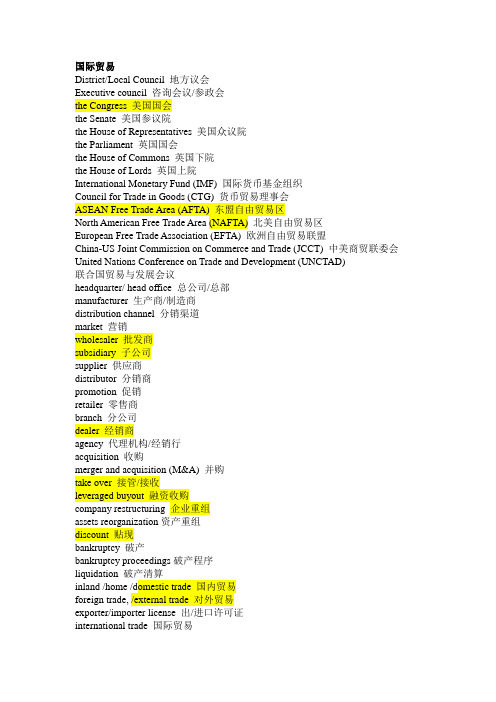
国际贸易District/Local Council 地方议会Executive council 咨询会议/参政会the Congress 美国国会the Senate 美国参议院the House of Representatives 美国众议院the Parliament 英国国会the House of Commons 英国下院the House of Lords 英国上院International Monetary Fund (IMF) 国际货币基金组织Council for Trade in Goods (CTG) 货币贸易理事会ASEAN Free Trade Area (AFTA) 东盟自由贸易区North American Free Trade Area (NAFTA) 北美自由贸易区European Free Trade Association (EFTA) 欧洲自由贸易联盟China-US Joint Commission on Commerce and Trade (JCCT) 中美商贸联委会United Nations Conference on Trade and Development (UNCTAD)联合国贸易与发展会议headquarter/ head office 总公司/总部manufacturer 生产商/制造商distribution channel 分销渠道market 营销wholesaler 批发商subsidiary 子公司supplier 供应商distributor 分销商promotion 促销retailer 零售商branch 分公司dealer 经销商agency 代理机构/经销行acquisition 收购merger and acquisition (M&A) 并购take over 接管/接收leveraged buyout 融资收购company restructuring 企业重组assets reorganization资产重组discount 贴现bankruptcy 破产bankruptcy proceedings破产程序liquidation 破产清算inland /home /domestic trade 国内贸易foreign trade, /external trade 对外贸易exporter/importer license 出/进口许可证international trade 国际贸易blanket purchase order 一揽子采购合同inquiry 询盘counter offer 还盘make a complete entry 正式/完整申报offer 发盘acceptance 接受blank endorsed 空白背书cargo receipt 承运货物收据customs clearance 结关carrier 承运人shipper order 托运单condemned goods 有问题的货物中欧工商峰会China-EU Business SummitConference多指较大型的会议Workshop是泛指较小型,但互动性较高的会议Symposium专指特殊学术讨论的集会Congress基本特点是由专属国家的,政府或非政府组织的代表或委员参加Convention是一种例行会议,大量聚集人群讨论其组织和政团事务Forum论坛实际上是一种公众集会,在那里人们交换思想,讨论问题,特别是重要的公众问题。
口译二阶段热点-话题四:关于二十国集团和金融危机
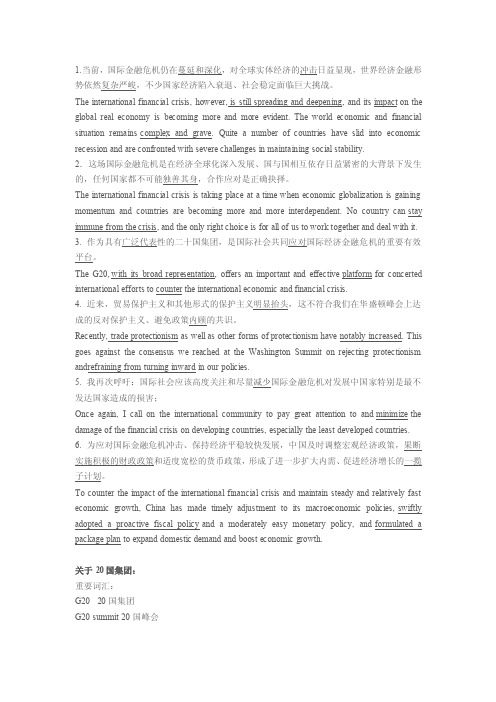
1.当前,国际金融危机仍在蔓延和深化,对全球实体经济的冲击日益显现,世界经济金融形势依然复杂严峻,不少国家经济陷入衰退、社会稳定面临巨大挑战。
The international financial crisis, however, is still spreading and deepening, and its impact on the global real economy is becoming more and more evident. The world economic and financial situation remains complex and grave. Quite a number of countries have slid into economic recession and are confronted with severe challenges in maintaining social stability.2.这场国际金融危机是在经济全球化深入发展、国与国相互依存日益紧密的大背景下发生的,任何国家都不可能独善其身,合作应对是正确抉择。
The international financial crisis is taking place at a time when economic globalization is gaining momentum and countries are becoming more and more interdependent. No country can stay immune from the crisis, and the only right choice is for all of us to work together and deal with it.3. 作为具有广泛代表性的二十国集团,是国际社会共同应对国际经济金融危机的重要有效平台。
G20峰会相关英文
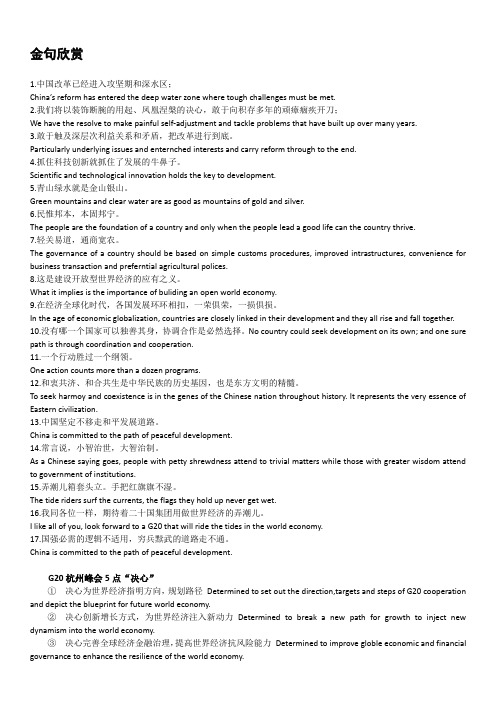
金句欣赏1.中国改革已经进入攻坚期和深水区;China’s reform has entered the deep water zone where tough challenges must be met.2.我们将以装饰断腕的用起、凤凰涅槃的决心,敢于向积存多年的顽瘴痼疾开刀;We have the resolve to make painful self-adjustment and tackle problems that have built up over many years.3.敢于触及深层次利益关系和矛盾,把改革进行到底。
Particularly underlying issues and enternched interests and carry reform through to the end.4.抓住科技创新就抓住了发展的牛鼻子。
Scientific and technological innovation holds the key to development.5.青山绿水就是金山银山。
Green mountains and clear water are as good as mountains of gold and silver.6.民惟邦本,本固邦宁。
The people are the foundation of a country and only when the people lead a good life can the country thrive.7.轻关易道,通商宽农。
The governance of a country should be based on simple customs procedures, improved intrastructures, convenience for business transaction and preferntial agricultural polices.8.这是建设开放型世界经济的应有之义。
二十国集团(g20)

二十国集团(g20)20国集团(G20)是一个国际经济合作论坛,于1999年9月25日由八国集团(G8)的财长在德国柏林成立,于华盛顿举办了第一届G20峰会,属于非正式对话的一种机制,由原八国集团以及其余12个重要经济体组成。
宗旨是为推动已工业化的发达国家和新兴市场国家之间就实质性问题进行开放及有建设性的讨论和研究,以寻求合作并促进国际金融稳定和经济的持续增长,按照以往惯例,国际货币基金组织与世界银行列席该组织的会议。
[1]20国集团成员涵盖面广,代表性强,该集团的GDP占全球经济的90%,贸易额占全球的80%,因此已取代G8成为全球经济合作的主要论坛。
G20的成立为国际社会齐心协力应对经济危机,推动全球治理机制改革带来了新动力和新契机全球治理开始从“西方治理”向“西方和非西方共同治理”转变。
2016年9月4日至5日二十国集团(G20)领导人第十一次峰会在中国杭州举行,这也是中国首次举办首脑峰会。
20国集团(G20)是一个国际经济合作论坛成立背景20国集团是由包括美国在内的七个工业化国家的财政部长于1999年6月在德国科隆首次提出的。
其目的是防止亚洲金融风暴重演,并允许有关国家就国际经济和货币政策进行非正式对话,这有利于国际金融和货币体系的稳定。
当时G20会议只有各国财长和央行行长参加。
自2008年由美国引发的全球金融危机以来,金融体系成为世界关注的焦点。
20国集团峰会取代了之前的8国集团峰会或20国集团财长会议,扩大了每个国家的发言权。
按照惯例,国际货币基金组织与世界银行列席该组织的会议。
20国集团的GDP总量约占世界的90%,人口约为40亿。
2009年9月举行的匹兹堡峰会将G20确定为国际经济合作主要论坛。
形象标识2016年G20峰会会标图案,用20根线条,描绘出一个桥形轮廓,同时辅以G20 2016 CHINA和篆刻隶书“中国”印章。
桥梁寓意着G20已成为全球经济增长之桥、国际社会合作之桥、面向未来的共赢之桥。
G20峰会公报全文
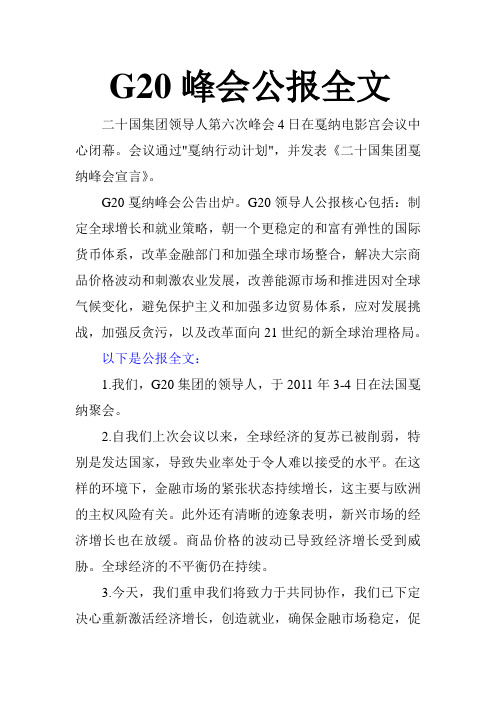
G20峰会公报全文二十国集团领导人第六次峰会4日在戛纳电影宫会议中心闭幕。
会议通过"戛纳行动计划",并发表《二十国集团戛纳峰会宣言》。
G20戛纳峰会公告出炉。
G20领导人公报核心包括:制定全球增长和就业策略,朝一个更稳定的和富有弹性的国际货币体系,改革金融部门和加强全球市场整合,解决大宗商品价格波动和刺激农业发展,改善能源市场和推进因对全球气候变化,避免保护主义和加强多边贸易体系,应对发展挑战,加强反贪污,以及改革面向21世纪的新全球治理格局。
以下是公报全文:1.我们,G20集团的领导人,于2011年3-4日在法国戛纳聚会。
2.自我们上次会议以来,全球经济的复苏已被削弱,特别是发达国家,导致失业率处于令人难以接受的水平。
在这样的环境下,金融市场的紧张状态持续增长,这主要与欧洲的主权风险有关。
此外还有清晰的迹象表明,新兴市场的经济增长也在放缓。
商品价格的波动已导致经济增长受到威胁。
全球经济的不平衡仍在持续。
3.今天,我们重申我们将致力于共同协作,我们已下定决心重新激活经济增长,创造就业,确保金融市场稳定,促进社会包容,使全球化服务于人们的需求。
增长和就业全球战略4.为解决全球经济面临的迫切挑战,我们承诺将协调我们的行动和政策。
我们每个国家都将尽到自己份内的责任。
5.我们已就《增长和就业行动计划》达成一致,以弥补短期内的经济增长弱点,增强中期内经济增长的基础。
发达经济体承诺采取政策构筑信心,支持经济增长,执行清晰、可靠和有针对性的措施来达成财政的巩固。
我们欢迎2011年10月26日欧洲领导人所做的,旨在恢复希腊债务可持续性,增强欧洲银行系统,构筑防火墙避免危机蔓延,铺设欧元区经济重大改革的基础,以及呼吁各方快速加以执行的相关决定。
我们支持意大利在欧元峰会上所提出的措施,同意由欧洲委员会主导的评估和监控细节。
在当前形势下,我们欢迎意大利决定邀请国际货币基金组织以每个季度评估进行的方式来公开监督其政策的执行。
20国集团首尔宣言(谭福华翻译)
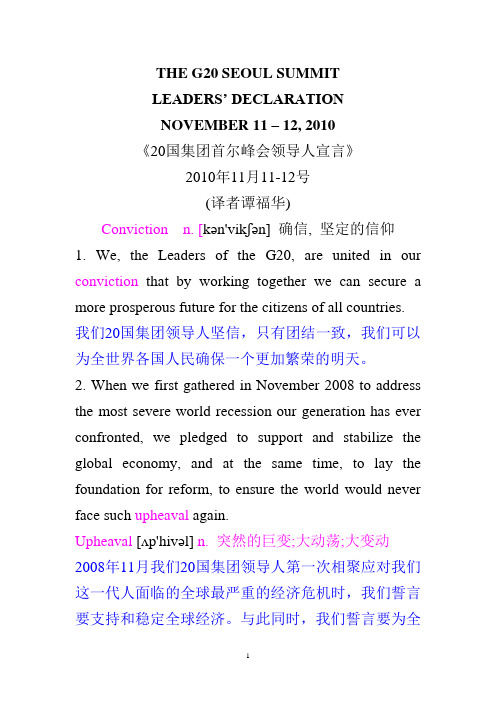
THE G20 SEOUL SUMMITLEADERS’ DECLARATIONNOVEMBER 11 – 12, 2010《20国集团首尔峰会领导人宣言》2010年11月11-12号(译者谭福华)Conviction n. [kən'vikʃən] 确信, 坚定的信仰1. We, the Leaders of the G20, are united in our conviction that by working together we can secure a more prosperous future for the citizens of all countries. 我们20国集团领导人坚信,只有团结一致,我们可以为全世界各国人民确保一个更加繁荣的明天。
2. When we first gathered in November 2008 to address the most severe world recession our generation has ever confronted, we pledged to support and stabilize the global economy, and at the same time, to lay the foundation for reform, to ensure the world would never face such upheaval again.Upheaval [ʌp'hivəl] n. 突然的巨变;大动荡;大变动2008年11月我们20国集团领导人第一次相聚应对我们这一代人面临的全球最严重的经济危机时,我们誓言要支持和稳定全球经济。
与此同时,我们誓言要为全球改革打下基础,要确保全世界不会再出现这种大动荡。
3. Over the past four Summits, we have worked with unprecedented cooperation to break the dramatic fall in the global economy to establish the basis for recovery and renewed growth.在过去的4届峰会中,我们精诚合作,规模空前,防止全球经济衰退,为全球经济恢复和新的增长奠定了基础。
首尔宣言 中文版
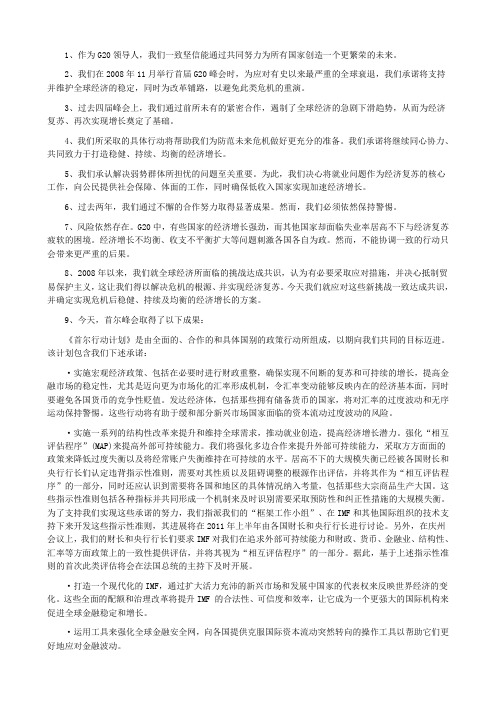
1、作为G20领导人,我们一致坚信能通过共同努力为所有国家创造一个更繁荣的未来。
2、我们在2008年11月举行首届G20峰会时,为应对有史以来最严重的全球衰退,我们承诺将支持并维护全球经济的稳定,同时为改革铺路,以避免此类危机的重演。
3、过去四届峰会上,我们通过前所未有的紧密合作,遏制了全球经济的急剧下滑趋势,从而为经济复苏、再次实现增长奠定了基础。
4、我们所采取的具体行动将帮助我们为防范未来危机做好更充分的准备。
我们承诺将继续同心协力、共同致力于打造稳健、持续、均衡的经济增长。
5、我们承认解决弱势群体所担忧的问题至关重要。
为此,我们决心将就业问题作为经济复苏的核心工作,向公民提供社会保障、体面的工作,同时确保低收入国家实现加速经济增长。
6、过去两年,我们通过不懈的合作努力取得显著成果。
然而,我们必须依然保持警惕。
7、风险依然存在。
G20中,有些国家的经济增长强劲,而其他国家却面临失业率居高不下与经济复苏疲软的困境。
经济增长不均衡、收支不平衡扩大等问题刺激各国各自为政。
然而,不能协调一致的行动只会带来更严重的后果。
8、2008年以来,我们就全球经济所面临的挑战达成共识,认为有必要采取应对措施,并决心抵制贸易保护主义,这让我们得以解决危机的根源、并实现经济复苏。
今天我们就应对这些新挑战一致达成共识,并确定实现危机后稳健、持续及均衡的经济增长的方案。
9、今天,首尔峰会取得了以下成果:《首尔行动计划》是由全面的、合作的和具体国别的政策行动所组成,以期向我们共同的目标迈进。
该计划包含我们下述承诺:·实施宏观经济政策、包括在必要时进行财政重整,确保实现不间断的复苏和可持续的增长,提高金融市场的稳定性,尤其是迈向更为市场化的汇率形成机制,令汇率变动能够反映内在的经济基本面,同时要避免各国货币的竞争性贬值。
发达经济体,包括那些拥有储备货币的国家,将对汇率的过度波动和无序运动保持警惕。
这些行动将有助于缓和部分新兴市场国家面临的资本流动过度波动的风险。
二十国集团领导人利雅得峰会宣言
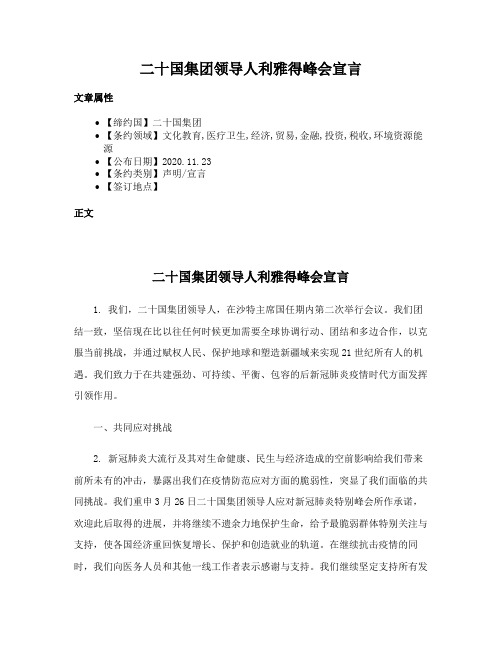
二十国集团领导人利雅得峰会宣言文章属性•【缔约国】二十国集团•【条约领域】文化教育,医疗卫生,经济,贸易,金融,投资,税收,环境资源能源•【公布日期】2020.11.23•【条约类别】声明/宣言•【签订地点】正文二十国集团领导人利雅得峰会宣言1. 我们,二十国集团领导人,在沙特主席国任期内第二次举行会议。
我们团结一致,坚信现在比以往任何时候更加需要全球协调行动、团结和多边合作,以克服当前挑战,并通过赋权人民、保护地球和塑造新疆域来实现21世纪所有人的机遇。
我们致力于在共建强劲、可持续、平衡、包容的后新冠肺炎疫情时代方面发挥引领作用。
一、共同应对挑战2. 新冠肺炎大流行及其对生命健康、民生与经济造成的空前影响给我们带来前所未有的冲击,暴露出我们在疫情防范应对方面的脆弱性,突显了我们面临的共同挑战。
我们重申3月26日二十国集团领导人应对新冠肺炎特别峰会所作承诺,欢迎此后取得的进展,并将继续不遗余力地保护生命,给予最脆弱群体特别关注与支持,使各国经济重回恢复增长、保护和创造就业的轨道。
在继续抗击疫情的同时,我们向医务人员和其他一线工作者表示感谢与支持。
我们继续坚定支持所有发展中国家和最不发达国家应对疫情引发的卫生、经济和社会影响,注意到非洲和小岛国面临的特殊挑战。
3. 我们已动员资源,以解决当前全球卫生领域融资需求,支持安全有效的新冠病毒诊断、治疗和疫苗的研发、生产和分配,并将根据各成员创新激励政策,不遗余力实现人人可负担和公平获取。
为此,我们全力支持所有合作努力,特别是“全球合作加速开发、生产、公平获取新冠肺炎防控新工具倡议”及其“新冠肺炎疫苗实施计划”,以及知识产权自愿许可。
我们承诺解决当前的全球融资需求,欢迎多边开发银行根据目前的多边行动,加强对各国获得新冠肺炎防控工具的资金支持,并鼓励他们采取更多行动。
我们认识到广泛免疫接种作为全球公共产品的作用。
4. 尽管受新冠肺炎疫情影响,全球经济在2020年出现急剧收缩,但随着各国经济逐渐重新开放及重大政策行动的积极影响开始显现,全球经济活动已部分回升。
翻译资格考试高级口译练习题:G20杭州峰会欢迎宴会致辞.doc
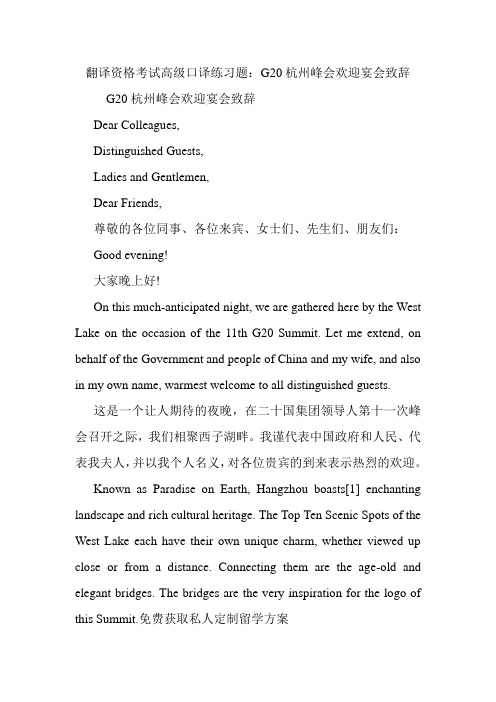
翻译资格考试高级口译练习题:G20杭州峰会欢迎宴会致辞G20杭州峰会欢迎宴会致辞Dear Colleagues,Distinguished Guests,Ladies and Gentlemen,Dear Friends,尊敬的各位同事、各位来宾、女士们、先生们、朋友们:Good evening!大家晚上好!On this much-anticipated night, we are gathered here by the West Lake on the occasion of the 11th G20 Summit. Let me extend, on behalf of the Government and people of China and my wife, and also in my own name, warmest welcome to all distinguished guests.这是一个让人期待的夜晚,在二十国集团领导人第十一次峰会召开之际,我们相聚西子湖畔。
我谨代表中国政府和人民、代表我夫人,并以我个人名义,对各位贵宾的到来表示热烈的欢迎。
Known as Paradise on Earth, Hangzhou boasts[1] enchanting landscape and rich cultural heritage. The Top Ten Scenic Spots of the West Lake each have their own unique charm, whether viewed up close or from a distance. Connecting them are the age-old and elegant bridges. The bridges are the very inspiration for the logo of this Summit.免费获取私人定制留学方案杭州素有人间天堂美誉,湖光山色、人文美景俯拾皆是,西湖十景或近观、或远眺,引人无限遐思,流连忘返。
G20峰会
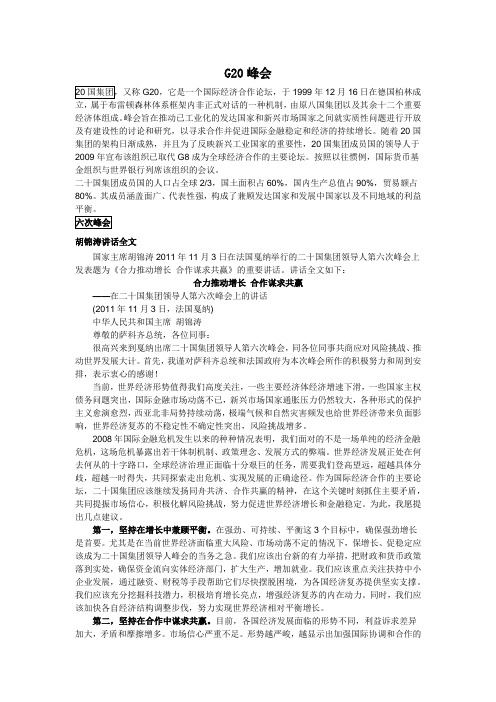
G20峰会胡锦涛讲话全文国家主席胡锦涛2011年11月3日在法国戛纳举行的二十国集团领导人第六次峰会上发表题为《合力推动增长合作谋求共赢》的重要讲话。
讲话全文如下:合力推动增长合作谋求共赢——在二十国集团领导人第六次峰会上的讲话(2011年11月3日,法国戛纳)中华人民共和国主席胡锦涛尊敬的萨科齐总统,各位同事:很高兴来到戛纳出席二十国集团领导人第六次峰会,同各位同事共商应对风险挑战、推动世界发展大计。
首先,我谨对萨科齐总统和法国政府为本次峰会所作的积极努力和周到安排,表示衷心的感谢!当前,世界经济形势值得我们高度关注,一些主要经济体经济增速下滑,一些国家主权债务问题突出,国际金融市场动荡不已,新兴市场国家通胀压力仍然较大,各种形式的保护主义愈演愈烈,西亚北非局势持续动荡,极端气候和自然灾害频发也给世界经济带来负面影响,世界经济复苏的不稳定性不确定性突出,风险挑战增多。
2008年国际金融危机发生以来的种种情况表明,我们面对的不是一场单纯的经济金融危机,这场危机暴露出若干体制机制、政策理念、发展方式的弊端。
世界经济发展正处在何去何从的十字路口,全球经济治理正面临十分艰巨的任务,需要我们登高望远,超越具体分歧,超越一时得失,共同探索走出危机、实现发展的正确途径。
作为国际经济合作的主要论坛,二十国集团应该继续发扬同舟共济、合作共赢的精神,在这个关键时刻抓住主要矛盾,共同提振市场信心,积极化解风险挑战,努力促进世界经济增长和金融稳定。
为此,我愿提出几点建议。
第一,坚持在增长中兼顾平衡。
在强劲、可持续、平衡这3个目标中,确保强劲增长是首要。
尤其是在当前世界经济面临重大风险、市场动荡不定的情况下,保增长、促稳定应该成为二十国集团领导人峰会的当务之急。
我们应该出台新的有力举措,把财政和货币政策落到实处,确保资金流向实体经济部门,扩大生产,增加就业。
我们应该重点关注扶持中小企业发展,通过融资、财税等手段帮助它们尽快摆脱困境,为各国经济复苏提供坚实支撑。
2017年CATTI三级口译测试题(附答案)

2017年CATTI三级口译测试题(附答案)第一题:二十国集团领导人杭州峰会5日在杭州国际博览中心继续举行。
国家主席主持会议并致闭幕辞。
在闭幕辞中指出,通过热烈而富有成果的讨论,在各方共同努力下,二十国集团领导人杭州峰会达成许多重要共识。
请看相关报道:The 11th summit of the Group of 20 (G20) major economies concluded on Monday, reaching extensive consensus on pursuing innovative, invigorated, interconnected and inclusive world economic growth.第11届二十国集团领导人峰会周一(9月5日)闭幕,就追求创新、活力、联动和包容的世界经济增长达成了广泛共识。
Consensus指general agreement among a group of people(一群人达成一致的意见),也就是“共识”,常用的短语搭配就是reach consensus on something(就某事达成共识)。
两岸关系中经常出现的“九二共识”就是 the 1992 Consensus。
在杭州G20第二、三、四、五阶段会议上,各成员、嘉宾国领导人和国际组织负责人就更高效的全球经济金融治理、强劲的国际贸易和投资、包容和联动式发展等议题深入交换意见,共同讨论气候变化、难民、反恐融资、全球公共卫生等影响世界经济的其他突出问题,达成广泛共识。
请结合原文翻译以下关于台风的短语:1、为世界经济指明方向,规划路径2、决心创新增长方式,为世界经济注入新动力3、完善全球经济金融治理,提高世界经济抗风险能力4、重振国际贸易和投资,构建开放型世界经济5、推动包容和联动式发展,让二十国集团合作成果惠及全球参考答案1、为世界经济指明方向,规划路径Set out the direction, targets and steps of G20 cooperation and depict the blueprint for future world economy.2、决心创新增长方式,为世界经济注入新动力Determined to break a new path for growth to inject new dynamism into the world economy.3、完善全球经济金融治理,提高世界经济抗风险能力Improve global economic and financial governance to enhance the resilience of the world economy.4、重振国际贸易和投资,构建开放型世界经济Revitalize international trade and investment as the key engines of growth and build an open world economy.5、推动包容和联动式发展,让二十国集团合作成果惠及全球Promote inclusive and interconnected development, so that G20 cooperation will deliver benefits to the whole world.第二题:日前,中国联通称,从10月1日起,中国联通将进一步取消集团统一套餐的漫游费。
G20峰会宣言全文(中英文)
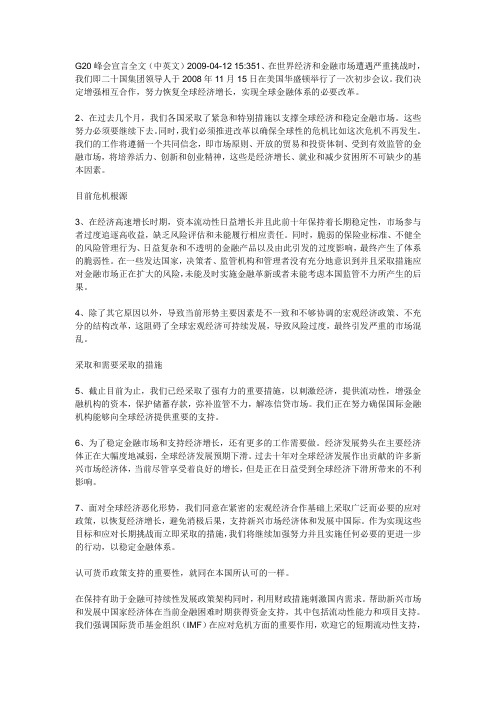
G20峰会宣言全文(中英文)2009-04-12 15:351、在世界经济和金融市场遭遇严重挑战时,我们即二十国集团领导人于2008年11月15日在美国华盛顿举行了一次初步会议。
我们决定增强相互合作,努力恢复全球经济增长,实现全球金融体系的必要改革。
2、在过去几个月,我们各国采取了紧急和特别措施以支撑全球经济和稳定金融市场。
这些努力必须要继续下去。
同时,我们必须推进改革以确保全球性的危机比如这次危机不再发生。
我们的工作将遵循一个共同信念,即市场原则、开放的贸易和投资体制、受到有效监管的金融市场,将培养活力、创新和创业精神,这些是经济增长、就业和减少贫困所不可缺少的基本因素。
目前危机根源3、在经济高速增长时期,资本流动性日益增长并且此前十年保持着长期稳定性,市场参与者过度追逐高收益,缺乏风险评估和未能履行相应责任。
同时,脆弱的保险业标准、不健全的风险管理行为、日益复杂和不透明的金融产品以及由此引发的过度影响,最终产生了体系的脆弱性。
在一些发达国家,决策者、监管机构和管理者没有充分地意识到并且采取措施应对金融市场正在扩大的风险,未能及时实施金融革新或者未能考虑本国监管不力所产生的后果。
4、除了其它原因以外,导致当前形势主要因素是不一致和不够协调的宏观经济政策、不充分的结构改革,这阻碍了全球宏观经济可持续发展,导致风险过度,最终引发严重的市场混乱。
采取和需要采取的措施5、截止目前为止,我们已经采取了强有力的重要措施,以刺激经济,提供流动性,增强金融机构的资本,保护储蓄存款,弥补监管不力,解冻信贷市场。
我们正在努力确保国际金融机构能够向全球经济提供重要的支持。
6、为了稳定金融市场和支持经济增长,还有更多的工作需要做。
经济发展势头在主要经济体正在大幅度地减弱,全球经济发展预期下滑。
过去十年对全球经济发展作出贡献的许多新兴市场经济体,当前尽管享受着良好的增长,但是正在日益受到全球经济下滑所带来的不利影响。
7、面对全球经济恶化形势,我们同意在紧密的宏观经济合作基础上采取广泛而必要的应对政策,以恢复经济增长,避免消极后果,支持新兴市场经济体和发展中国际。
(中英对照)金砖国家媒体峰会北京宣言
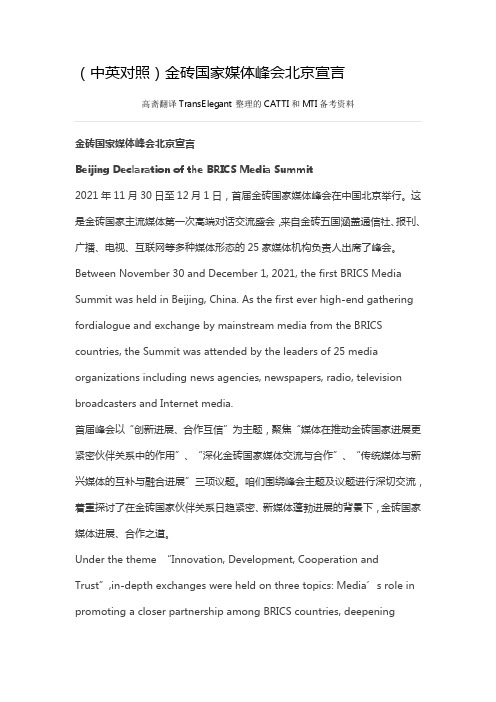
(中英对照)金砖国家媒体峰会北京宣言高斋翻译TransElegant 整理的CATTI和MTI备考资料金砖国家媒体峰会北京宣言Beijing Declaration of the BRICS Media Summit2021年11月30日至12月1日,首届金砖国家媒体峰会在中国北京举行。
这是金砖国家主流媒体第一次高端对话交流盛会,来自金砖五国涵盖通信社、报刊、广播、电视、互联网等多种媒体形态的25家媒体机构负责人出席了峰会。
Between November 30 and December 1, 2021, the first BRICS Media Summit was held in Beijing, China. As the first ever high-end gathering fordialogue and exchange by mainstream media from the BRICS countries, the Summit was attended by the leaders of 25 media organizations including news agencies, newspapers, radio, television broadcasters and Internet media.首届峰会以“创新进展、合作互信”为主题,聚焦“媒体在推动金砖国家进展更紧密伙伴关系中的作用”、“深化金砖国家媒体交流与合作”、“传统媒体与新兴媒体的互补与融合进展”三项议题。
咱们围绕峰会主题及议题进行深切交流,着重探讨了在金砖国家伙伴关系日趋紧密、新媒体蓬勃进展的背景下,金砖国家媒体进展、合作之道。
Under the theme “Innovation, Development, Cooperation and Trust”,in-depth exchanges were held on three topics: Media’s role in promoting a closer partnership among BRICS countries, deepeningBRICS’media exchanges and cooperation and how traditional and new media both complement and converge. We assessed ways in which BRICS media could better cooperate against the backdrop of increasingly closer ties among the BRICS countries.咱们以为,现今世界继续经历着深刻而复杂的转变,世界多极化、经济全世界化深切进展,文化多样化、社会信息化持续推动。
日语口译词汇1
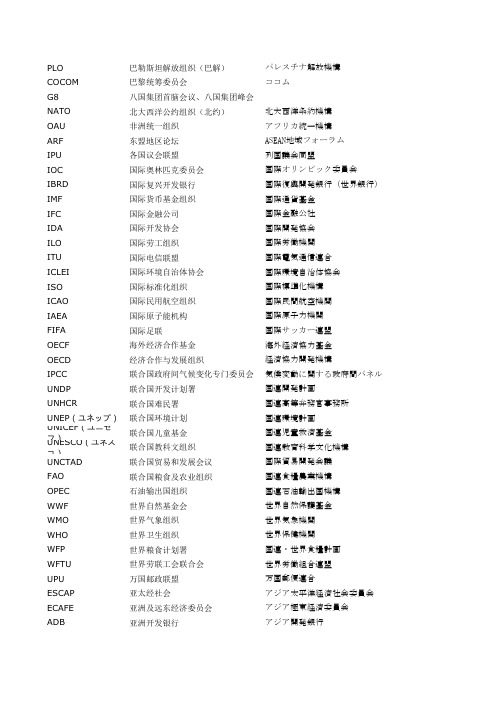
PLO巴勒斯坦解放组织(巴解)パレスチナ解放機構COCOM巴黎统筹委员会ココムG8八国集团首脑会议、八国集团峰会NATO北大西洋公约组织(北约)北大西洋条約機構OAU非洲统一组织アフリカ統一機構ARF东盟地区论坛ASEAN地域フォーラムIPU各国议会联盟列国議会同盟IOC国际奥林匹克委员会国際オリンピック委員会IBRD国际复兴开发银行国際復興開発銀行(世界銀行)IMF国际货币基金组织国際通貨基金IFC国际金融公司国際金融公社IDA国际开发协会国際開発協会ILO国际劳工组织国際労働機関ITU国际电信联盟国際電気通信連合ICLEI国际环境自治体协会国際環境自治体協会ISO国际标准化组织国際標準化機構ICAO国际民用航空组织国際民間航空機関IAEA国际原子能机构国際原子力機関FIFA国际足联国際サッカー連盟OECF海外经济合作基金海外経済協力基金OECD经济合作与发展组织経済協力開発機構IPCC联合国政府间气候变化专门委员会気候変動に関する政府間パネルUNDP联合国开发计划署国連開発計画UNHCR联合国难民署国連高等弁務官事務所UNEP(ユネップ)联合国环境计划国連環境計画UNICEF(ユニセフ)联合国儿童基金国連児童救済基金UNESCO(ユネスコ)联合国教科文组织国連教育科学文化機構UNCTAD联合国贸易和发展会议国際貿易開発会議FAO联合国粮食及农业组织国連食糧農業機構OPEC石油输出国组织国連石油輸出国機構WWF世界自然基金会世界自然保護基金WMO世界气象组织世界気象機関WHO世界卫生组织世界保健機関WFP世界粮食计划署国連・世界食糧計画WFTU世界劳联工会联合会世界労働組合連盟UPU万国邮政联盟万国郵便連合ESCAP亚太经社会アジア太平洋経済社会委員会ECAFE亚洲及远东经济委员会アジア極東経済委員会ADB亚洲开发银行アジア開発銀行AFC亚足联アジアサッカー連盟PKO联合国维和活动国際連合平和維持活動RTA地区贸易协定地域貿易協定。
口译现场 史上最全的口译场景分析 视频等等
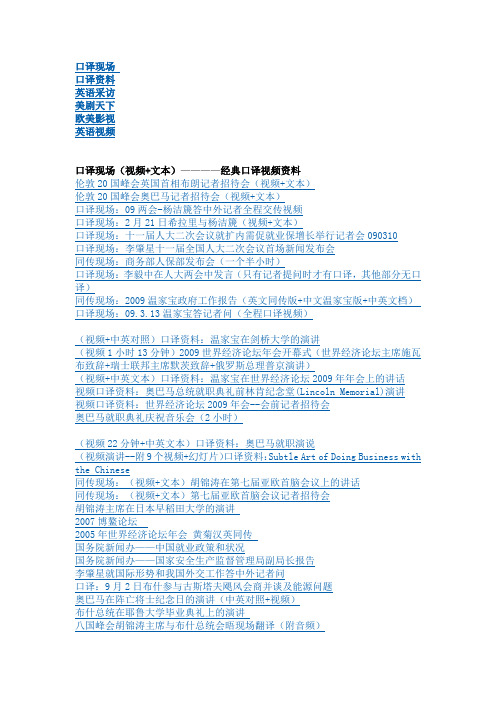
口译现场口译资料英语采访美剧天下欧美影视英语视频口译现场(视频+文本)————经典口译视频资料伦敦20国峰会英国首相布朗记者招待会(视频+文本)伦敦20国峰会奥巴马记者招待会(视频+文本)口译现场:09两会-杨洁篪答中外记者全程交传视频口译现场:2月21日希拉里与杨洁篪(视频+文本)口译现场:十一届人大二次会议就扩内需促就业保增长举行记者会090310口译现场:李肇星十一届全国人大二次会议首场新闻发布会同传现场:商务部人保部发布会(一个半小时)口译现场:李毅中在人大两会中发言(只有记者提问时才有口译,其他部分无口译)同传现场:2009温家宝政府工作报告(英文同传版+中文温家宝版+中英文档)口译现场:09.3.13温家宝答记者问(全程口译视频)(视频+中英对照)口译资料:温家宝在剑桥大学的演讲(视频1小时13分钟)2009世界经济论坛年会开幕式(世界经济论坛主席施瓦布致辞+瑞士联邦主席默茨致辞+俄罗斯总理普京演讲)(视频+中英文本)口译资料:温家宝在世界经济论坛2009年年会上的讲话视频口译资料:奥巴马总统就职典礼前林肯纪念堂(Lincoln Memorial)演讲视频口译资料:世界经济论坛2009年会--会前记者招待会奥巴马就职典礼庆祝音乐会(2小时)(视频22分钟+中英文本)口译资料:奥巴马就职演说(视频演讲--附9个视频+幻灯片)口译资料:Subtle Art of Doing Business with the Chinese同传现场:(视频+文本)胡锦涛在第七届亚欧首脑会议上的讲话同传现场:(视频+文本)第七届亚欧首脑会议记者招待会胡锦涛主席在日本早稻田大学的演讲2007博鳌论坛2005年世界经济论坛年会黄菊汉英同传国务院新闻办——中国就业政策和状况国务院新闻办——国家安全生产监督管理局副局长报告李肇星就国际形势和我国外交工作答中外记者问口译:9月2日布什参与古斯塔夫飓风会商并谈及能源问题奥巴马在阵亡将士纪念日的演讲(中英对照+视频)布什总统在耶鲁大学毕业典礼上的演讲八国峰会胡锦涛主席与布什总统会晤现场翻译(附音频)妮可基德曼“口译”面试NBC版本的2008北京奥运会开幕式下载,口译资料:看看白宫里面什么样(54分钟视频)(英文字幕)视频口译资料:奥巴马经济顾问委员会主任Christina Romer谈论一份关于就业机会的报告口译资料:国际货币基金组织懂事总经理2008年12月15日西班牙讲话(视频+译文)口译资料:奥巴马首次发表网络视频讲话经典名人演讲(含视频)比尔盖茨在上海交大的演讲比尔盖茨CES2008演讲比尔盖茨斯坦福大学的演讲Tom Brokaw在斯坦福大学06毕业典礼上的演讲Dana Gioia 在斯坦福大学07毕业典礼上的演讲Oprah Winfrey在斯坦福大学08毕业典礼上的演讲布什总统在耶鲁大学毕业典礼上的演讲布莱尔在清华大学的演讲沃伦·巴菲特:巴菲特在佛罗里达大学的演讲北大教授朱苏力在美国大学的演讲克林顿演讲时全场像明星演唱会一样美国优秀教师莱福•艾斯奎斯演讲理查安利十周年庆典晚会上演讲克林顿在清华就艾滋病等问题发表演讲(实录)布什介绍椭圆形办公室林毅夫《剑桥马歇尔讲座》马云在英国演讲视频(英文)比尔盖茨北大演讲比尔·盖茨博鳌亚洲论坛发表演讲比尔盖茨在清华大学的演讲J·K·罗琳在哈佛大学08年毕业典礼上的演讲第十一届21世纪全国英语演讲比赛前十名选手的精彩视频(视频+中英文本)口译资料:布什2009告别演说(视频演讲)口译资料:Speech by a school girl in UN conference on environment(视频+文本)2008美国总统大选汇总帖(总统辩论及分析+民主党大会各演讲+共和党大会各演讲)总统辩论及分析:《2008年美国总统第一场辩论》在线观看+文本《2008年美国总统第一场辩论》分析《2008年美国总统第二场辩论》在线观看+文本《2008年美国总统第二场辩论》分析《2008年美国总统第三场辩论》在线观看+文本《2008年美国总统第三场辩论》分析 The Grand Finale《2008年美国副总统辩论》在线观看+文本《2008年美国副总统辩论》分析民主党大会各演讲:《奥巴马8月28日在民主党大会接受总统候选人提名演说》在线观看+文本《Joseph R. Biden民主党大会接受副总统候选人提名演讲》在线观看+文本《比尔·克林顿8月27日在民主党大会上声援奥巴马演说》在线观看+文本《希拉里8月26日在民主党大会上声援奥巴马演说》在线观看+文本《2008美国大选民主党大会上Michelle Obama演讲》在线观看+文本《2008美国大选民主党大会上Edward Kennedy演讲》在线观看+文本《2008美国大选民主党大会上Al Gore演讲》在线观看+文本共和党大会各演讲:《麦凯恩共和党大会接受总统候选人提名演说》在线观看+文本《佩林9月3号在共和党大会接受副总统候选人提名演说》在线观看+文本《2008美国大选共和党大会上Rudy Giuliani 演讲》在线观看+文本《2008美国大选共和党大会上Joe Lieberman 演讲》在线观看+文本《2008美国大选共和党大会上布什演讲》在线观看+文本颁奖典礼《第81届奥斯卡颁奖典礼》完整版 175分钟第81届奥斯卡颁奖典礼红地毯2009年全英音乐奖颁奖典礼全场完整呈现2009第51届格莱美颁奖典礼149分钟完整版(中文字幕)35届人民选择奖颁奖典礼(35th People's Choice Awards)欧美影视:第66届美国金球奖颁奖典礼(CCTV-6,中文字幕)口译文本资料————演讲文稿(中英对照)口译资料:中国政府白皮书《中国的减灾行动》(中英对照)口译资料:杨洁篪在外交部五四青年节开放日上的致辞(中英对照)口译资料:大学生公众代表在外交部“五四”青年节大学生专场公众开放日上的发言(中英对照)口译资料:中欧应扩大合作共同反对贸易保护主义(王岐山撰文)(中英对照)口译资料:曾培炎在博鳌亚洲论坛2009年年会午餐会上的讲话(中英对照)口译资料:郑新立在博鳌亚洲论坛年会上的发言(中英对照)口译资料:刘结一部长助理在联合国亚太经社会第65届会议一般性辩论中的发言(中英对照)(原稿+译稿)温家宝在2009博鳌亚洲论坛开幕式上的演讲口译资料:精诚携手共克时艰——驻悉尼总领事胡山谈中国与新州合作关系(原稿+译文)口译资料:上海合作组织阿富汗问题特别会议中方讲话(中英对照)胡锦涛在G20国金融峰会上的讲话(中英对照)口译资料:4月1日《中法新闻公报》全文(中英对照)口译资料:上海合作组织成员国和阿富汗伊斯兰共和国关于打击恐怖主义、毒品走私和有组织犯罪的声明(中英对照)口译资料:2009年2月27日中国商务部长陈德铭在中英经贸合作研讨会致辞(中英对照)口译资料:09.3.12杨洁篪在美国战略与国际问题研究中心演讲(中英对照)口译资料:杨洁篪部长第十八届世界公共关系大会上做主旨发言(中英对照)口译资料:戴秉国在美国布鲁金斯学会发表纪念中美建交30周年演讲(中英对照)口译资料:何亚非副部长在安理会索马里海盗问题部长级会议上的发言(中英对照)口译资料:2008诺贝尔奖颁奖典礼开幕辞口译资料:英国首相布朗、法国总统萨科齐和欧盟委员会主席巴罗佐8日在伦敦的新闻发布会口译资料:第五次中美战略经济对话成果情况说明口译资料:加拿大总理电视演-讲抨击反对党结盟口译资料:奥巴马感恩节发表讲话鼓励国人挺过难关口译资料:胡锦涛在APEC第16次领导人非正式会议上的讲话(中英对照)口译资料:欧盟主席巴罗佐国家行政学院讲话口译资料:胡锦涛在APEC工商领导人峰会上的演讲(中英对照)口译资料:适应时代的需要,发挥建设性作用--前中国央行行长戴相龙二十国集团成立十周年感想(中英对照)口译资料:美国《新闻周刊》独家专访温家宝:我们应携手合作(中英对照)口译资料:刘振民大使在联大审议联合国建设和平委员会报告及秘书长关于建设和平基金报告时的发言(中英对照)温家宝出席美国友好团体欢迎午宴就中美关系发表演讲(中英对照)温家宝在联合国千年发展目标高级别会议上的讲话(中英对照)温家宝在2008年世界经济论坛(夏季达沃斯论坛)上的讲话(中英对照)王光亚大使在联合国发起支持中国汶川地震灾区早期恢复呼吁会议上的讲话(中英对照)杨洁篪外长在联合国非洲发展高级别会议上的讲话(中英对照)温家宝在第63届联大一般性辩论上的发言(中英对照)2008年刘淇在北京奥运会闭幕式上的致辞(中英对照)2008年残奥委会主席克雷文在北京残奥会开幕式的致辞(中英对照)2008年刘淇在北京残奥会开幕式上的致辞(中英对照)2008年胡锦涛在欢迎出席残奥会贵宾宴会上的祝酒词(中英对照)2008年残奥委会主席克雷文在北京残奥会闭幕式的致辞(中英对照)口译:2008年罗格在国际奥委会第120次全会开幕式上的讲话(中英对照)口译:2008年胡锦涛在北京奥运会欢迎宴会上的祝酒词(中英对照)口译:奥巴马在阵亡将士纪念日的演讲(中英对照)口译:胡锦涛博鳌亚洲论坛2008年年会开幕式上演讲【中英对照】罗格在奥运开幕式+闭幕式发言(中英对照)其他资料资料下载:美国19家银行测试报告概述(PDF,38页)英国政府发布的《流感信息宣传手册》(中英Pdf版本)口译资料:崇泉部长助理在中欧知识产权高层论坛上的演讲(中英对照)口译资料:博鳌亚洲论坛简介(全文)National Human Rights Action Plan of China (2009-2010)口译资料:全国人民代表大会常务委员会工作报告(中英对照)(中英对照)经典口译资料:中美能源与气候变化合作路线图(PDF报告58页英文+54页中文+新闻发布会信息)口译资料:比尔与美琳达·盖茨基金会(Bill & Melinda Gates Foundation)2009年度报告(附视频)口译资料:英方首次公开发表对华战略文件《英中合作框架》--(The UK and China: A framework for engagement )口译资料:中日韩领导人会议发表《中日韩合作行动计划》(中英对照)口译资料:中日韩《三国伙伴关系联合声明》(中英对照)口译资料:中美战略经济对话介绍-China-U.S. Strategic Economic Dialogue 口译资料:20国集团通过应对当前金融危机的《华盛顿声明》口译资料:20国集团介绍口译资料:20国集团财政部长与央行行长会议公报口译资料:中越联合声明口译资料:G20领导人金融市场和世界经济峰会——专题整理口译资料:二十国集团金融市场和世界经济峰会的宣言(音频+文本)口译资料:11月14日布什在G20金融市场和世界经济峰会前宴会上的讲话(音频+文本)口译资料:11月15日布什在G20金融市场和世界经济峰会结束记者招待会上的讲话口译资料:20国集团财政部长与央行行长会议公报口译资料:胡锦涛在二十国集团领导人金融市场和世界经济峰会上的讲话口译资料:适应时代的需要,发挥建设性作用--前中国央行行长戴相龙二十国集团成立十周年感想口译资料:20国集团通过应对当前金融危机的《华盛顿声明》口译资料:20国集团介绍口译资料:第七届亚欧首脑会议汇总贴(胡锦涛温家宝演讲+开幕式+记者招待会+三份文件)同传现场:同传现场:(视频+文本)胡锦涛在第七届亚欧首脑会议上的讲话同传现场:第七届亚欧首脑会议开幕式同传现场:(视频+文本)第七届亚欧首脑会议记者招待会口译资料:温家宝在第七届亚欧首脑会议上的讲话(中英对照)口译资料:口译资料:第七届亚欧首脑会议关于国际金融形势的声明(中英对照)口译资料:第七届亚欧首脑会议主席声明(中文+英文)口译资料:第七届亚欧首脑会议-可持续发展北京宣言(中文+英文)中高口二阶段练习素材系列中高口二阶段练习素材:金融危机与亚洲中高口二阶段练习素材:危机中的中英合作中高口二阶段练习素材:庆祝和展望中高口二阶段练习素材:知识产权中高口二阶段练习素材:回顾2008成就中高口二阶段练习素材:加强中美经济关系的四点建议奥巴马+希拉里——近期演讲系列(视频+文本)奥巴马:奥巴马演讲:应对甲型H1N1流感(视频下载+文本)希拉里阐述奥巴马政府外交政策(视频+文本)奥巴马访弱势群体学校发表演讲(视频+文本)奥巴马+副总统演讲:美国复苏与再投资法案奥巴马复活节演讲(视频下载+文本)奥巴马访问土耳其兜售新战略(视频+文本)奥巴马就美国汽车业形势发表讲话(音频+文本)奥巴马阿富汗巴基斯坦新战略(音频+文本)3月24日奥巴马新闻发布会(音频+文本)奥巴马:美国伊朗能有新开始(视频+文本)奥巴马演讲:小企业救助计划(视频+文本)希拉里:希拉里International Roma Day演讲(视频+文本)希拉里美洲开发银行会议演讲(视频+文本)希拉里阐述奥巴马政府外交政策(视频+文本)希拉里演讲:领跑世界能源环境合作(视频+文本)。
2020g20峰会主题是什么
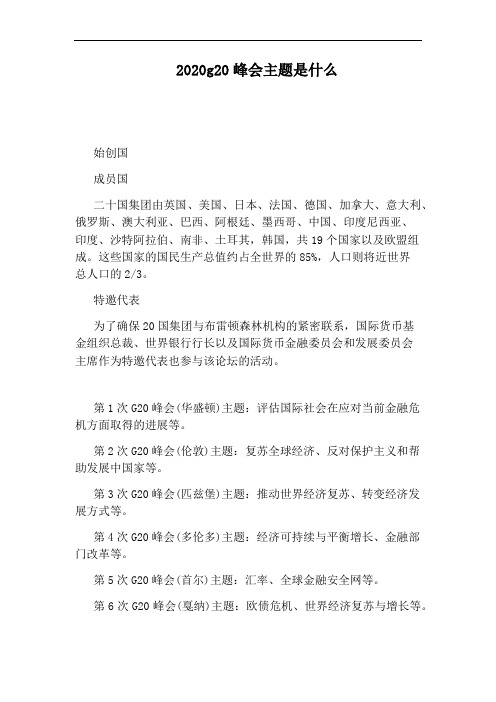
2020g20峰会主题是什么
始创国
成员国
二十国集团由英国、美国、日本、法国、德国、加拿大、意大利、俄罗斯、澳大利亚、巴西、阿根廷、墨西哥、中国、印度尼西亚、
印度、沙特阿拉伯、南非、土耳其,韩国,共19个国家以及欧盟组成。
这些国家的国民生产总值约占全世界的85%,人口则将近世界
总人口的2/3。
特邀代表
为了确保20国集团与布雷顿森林机构的紧密联系,国际货币基
金组织总裁、世界银行行长以及国际货币金融委员会和发展委员会
主席作为特邀代表也参与该论坛的活动。
第1次G20峰会(华盛顿)主题:评估国际社会在应对当前金融危机方面取得的进展等。
第2次G20峰会(伦敦)主题:复苏全球经济、反对保护主义和帮助发展中国家等。
第3次G20峰会(匹兹堡)主题:推动世界经济复苏、转变经济发展方式等。
第4次G20峰会(多伦多)主题:经济可持续与平衡增长、金融部门改革等。
第5次G20峰会(首尔)主题:汇率、全球金融安全网等。
第6次G20峰会(戛纳)主题:欧债危机、世界经济复苏与增长等。
第7次G20峰会(洛斯卡沃斯)主题:世界经济形势、国际金融体系等。
第8次G20峰会(圣彼得堡)主题:世界经济增长和金融稳定、就业和投资等。
第9次G20峰会(布里斯班)主题:促经济增长与促就业、全球经济恢复力等。
第10次G20峰会(安塔利亚)主题:共同行动以实现包容和稳健增长等。
第11次G20峰会(杭州)主题:构建创新、活力、联动、包容的世界经济。
第12次G20峰会(德国汉堡)主题:确保经济稳定性、改善可持续性、负责任地发展。
【口译资料】2012年 达沃斯 世界经济论坛 中英文
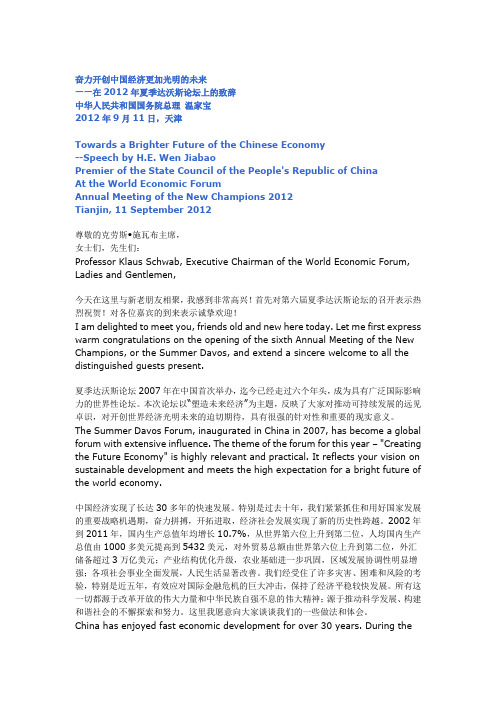
奋力开创中国经济更加光明的未来——在2012年夏季达沃斯论坛上的致辞中华人民共和国国务院总理温家宝2012年9月11日,天津Towards a Brighter Future of the Chinese Economy--Speech by H.E. Wen JiabaoPremier of the State Council of the People's Republic of ChinaAt the World Economic ForumAnnual Meeting of the New Champions 2012Tianjin, 11 September 2012尊敬的克劳斯•施瓦布主席,女士们,先生们:Professor Klaus Schwab, Executive Chairman of the World Economic Forum, Ladies and Gentlemen,今天在这里与新老朋友相聚,我感到非常高兴!首先对第六届夏季达沃斯论坛的召开表示热烈祝贺!对各位嘉宾的到来表示诚挚欢迎!I am delighted to meet you, friends old and new here today. Let me first express warm congratulations on the opening of the sixth Annual Meeting of the New Champions, or the Summer Davos, and extend a sincere welcome to all the distinguished guests present.夏季达沃斯论坛2007年在中国首次举办,迄今已经走过六个年头,成为具有广泛国际影响力的世界性论坛。
本次论坛以“塑造未来经济”为主题,反映了大家对推动可持续发展的远见卓识,对开创世界经济光明未来的迫切期待,具有很强的针对性和重要的现实意义。
- 1、下载文档前请自行甄别文档内容的完整性,平台不提供额外的编辑、内容补充、找答案等附加服务。
- 2、"仅部分预览"的文档,不可在线预览部分如存在完整性等问题,可反馈申请退款(可完整预览的文档不适用该条件!)。
- 3、如文档侵犯您的权益,请联系客服反馈,我们会尽快为您处理(人工客服工作时间:9:00-18:30)。
口译资料:二十国集团金融市场和世界经济峰会的宣言Declaration of the Summit on Financial Markets and the World Economy1. We, the Leaders of the Group of Twenty, held an initial meeting in Washington on November 15, 2008, amid serious challenges to the world economy and financial markets. We are determined to enhance our cooperation and work together to restore global growth and achieve needed reforms in the world’s financial systems.2. Over the past months our countries have taken urgent and exceptional measures to support the global economy and stabilize financial markets. These efforts must continue. At the same time, we must lay the foundation for reform to help to ensure that a global crisis, such as this one, does not happen again. Our work will be guided by a shared belief that market principles, open trade and investment regimes, and effectively regulated financial markets foster the dynamism, innovation, and entrepreneurship that are essential for economic growth, employment, and poverty reduction.Root Causes of the Current Crisis3. During a period of strong global growth, growing capital flows, and prolonged stability earlier this decade, market participants sought higher yields without an adequate appreciation of the risks and failed to exercise proper due diligence. At the same time, weak underwriting standards, unsound risk management practices, increasingly complex and opaque financial products, and consequent excessive leverage combined to create vulnerabilities in the system. Policy-makers, regulators and supervisors, in some advanced countries, did not adequately appreciate and address the risks building up in financial markets, keep pace with financial innovation, or take into account the systemic ramifications of domestic regulatory actions.4. Major underlying factors to the current situation were, among others, inconsistent and insufficiently coordinated macroeconomic policies, inadequate structural reforms, which led to unsustainable global macroeconomic outcomes. These developments, together, contributed to excesses and ultimately resulted in severe market disruption.Actions Taken and to Be Taken5. We have taken strong and significant actions to date to stimulate our economies, provide liquidity, strengthen the capital of financial institutions, protect savings and deposits, address regulatory deficiencies, unfreeze credit markets, and are working to ensure that international financial institutions (IFIs) can provide critical support for the global economy.6. But more needs to be done to stabilize financial markets and support economic growth. Economic momentum is slowing substantially in major economies and the global outlook has weakened. Many emerging market economies, which helped sustain the world economy this decade, are still experiencing good growth but increasingly are being adversely impacted by the worldwide slowdown.7. Against this background of deteriorating economic conditions worldwide, we agreed that a broader policy response is needed, based on closer macroeconomic cooperation, to restore growth, avoid negative spillovers and support emerging market economies and developing countries. As immediate steps to achieve these objectives, as well as to address longer-term challenges, we will:Continue our vigorous efforts and take whatever further actions are necessary to stabilize the financial system.Recognize the importance of monetary policy support, as deemed appropriate to domestic conditions. Use fiscal measures to stimulate domestic demand to rapid effect, as appropriate, while maintaining a policy framework conducive to fiscal sustainability.Help emerging and developing economies gain access to finance in current difficult financial conditions, including through liquidity facilities and program support. We stress the International Monetary Fund’s (IMF) important role in crisis response, welcome its new short-term liquidity facility, and urge the ongoing review of its instruments and facilities to ensure flexibility. Encourage the World Bank and other multilateral development banks (MDBs) to use their full capacity in support of their development agenda, and we welcome the recent introduction of new facilities by the World Bank in the areas of infrastructure and trade finance.Ensure that the IMF, World Bank and other MDBs have sufficient resources to continue playing their role in overcoming the crisis.Common Principles for Reform of Financial Markets8. In addition to the actions taken above, we will implement reforms that will strengthen financial markets and regulatory regimes so as to avoid future crises. Regulation is first and foremost the responsibility of national regulators who constitute the first line of defense against market instability. However, our financial markets are global in scope, therefore, intensified international cooperation among regulators and strengthening of international standards, where necessary, and their consistent implementation is necessary to protect against adverse cross-border, regional and global developments affecting international financial stability. Regulators must ensure that their actions support market discipline, avoid potentially adverse impacts on other countries, including regulatory arbitrage, and support competition, dynamism and innovation in the marketplace. Financial institutions must also bear their responsibility for the turmoil and should do their part to overcome it including by recognizing losses, improving disclosure and strengthening their governance and risk management practices.9. We commit to implementing policies consistent with the following common principles for reform.Strengthening Transparency and Accountability: We will strengthen financial market transparency, including by enhancing required disclosure on complex financial products and ensuring complete and accurate disclosure by firms of their financial conditions. Incentives should be aligned to avoid excessive risk-taking.Enhancing Sound Regulation: We pledge to strengthen our regulatory regimes, prudential oversight, and risk management, and ensure that all financial markets, products and participants are regulated or subject to oversight, as appropriate to their circumstances. We will exercise strong oversight over credit rating agencies, consistent with the agreed and strengthened international code of conduct. We will also make regulatory regimes more effective over the economic cycle, while ensuring that regulation is efficient, does not stifle innovation, and encourages expanded trade in financial products and services. We commit to transparent assessments of our national regulatory systems.Promoting Integrity in Financial Markets: We commit to protect the integrity of the world’s financial markets by bolstering investor and consumer protection, avoiding conflicts of interest, preventing illegal market manipulation, fraudulent activities and abuse, and protecting againstillicit finance risks arising from non-cooperative jurisdictions. We will also promote information sharing, including with respect to jurisdictions that have yet to commit to international standards with respect to bank secrecy and transparency.Reinforcing International Cooperation: We call upon our national and regional regulators to formulate their regulations and other measures in a consistent manner. Regulators should enhance their coordination and cooperation across all segments of financial markets, including with respect to cross-border capital flows. Regulators and other relevant authorities as a matter of priority should strengthen cooperation on crisis prevention, management, and resolution.Reforming International Financial Institutions: We are committed to advancing the reform of the Bretton Woods Institutions so that they can more adequately reflect changing economic weights in the world economy in order to increase their legitimacy and effectiveness. In this respect, emerging and developing economies, including the poorest countries, should have greater voice and representation. The Financial Stability Forum (FSF) must expand urgently to a broader membership of emerging economies, and other major standard setting bodies should promptly review their membership. The IMF, in collaboration with the expanded FSF and other bodies, should work to better identify vulnerabilities, anticipate potential stresses, and act swiftly to play a key role in crisis response.Tasking of Ministers and Experts10. We are committed to taking rapid action to implement these principles. We instruct our Finance Ministers, as coordinated by their 2009 G-20 leadership (Brazil, UK, Republic of Korea), to initiate processes and a timeline to do so. An initial list of specific measures is set forth in the attached Action Plan, including high priority actions to be completed prior to March 31, 2009.In consultation with other economies and existing bodies, drawing upon the recommendations of such eminent independent experts as they may appoint, we request our Finance Ministers to formulate additional recommendations, including in the following specific areas:Mitigating against pro-cyclicality in regulatory policy;Reviewing and aligning global accounting standards, particularly for complex securities in times of stress;Strengthening the resilience and transparency of credit derivatives markets and reducing their systemic risks, including by improving the infrastructure of over-the-counter markets; Reviewing compensation practices as they relate to incentives for risk taking and innovation; Reviewing the mandates, governance, and resource requirements of the IFIs; andDefining the scope of systemically important institutions and determining their appropriate regulation or oversight.11. In view of the role of the G-20 in financial systems reform, we will meet again by April 30, 2009, to review the implementation of the principles and decisions agreed today.Commitment to an Open Global Economy12. We recognize that these reforms will only be successful if grounded in a commitment to free market principles, including the rule of law, respect for private property, open trade and investment, competitive markets, and efficient, effectively regulated financial systems. These principles areessential to economic growth and prosperity and have lifted millions out of poverty, and have significantly raised the global standard of living. Recognizing the necessity to improve financial sector regulation, we must avoid over-regulation that would hamper economic growth and exacerbate the contraction of capital flows, including to developing countries.13. We underscore the critical importance of rejecting protectionism and not turning inward in times of financial uncertainty. In this regard, within the next 12 months, we will refrain from raising new barriers to investment or to trade in goods and services, imposing new export restrictions, or implementing World Trade Organization (WTO) inconsistent measures to stimulate exports. Further, we shall strive to reach agreement this year on modalities that leads to a successful conclusion to the WTO’s Doha Devel opment Agenda with an ambitious and balanced outcome. We instruct our Trade Ministers to achieve this objective and stand ready to assist directly, as necessary. We also agree that our countries have the largest stake in the global trading system and therefore each must make the positive contributions necessary to achieve such an outcome.14. We are mindful of the impact of the current crisis on developing countries, particularly the most vulnerable. We reaffirm the importance of the Millennium Development Goals, the development assistance commitments we have made, and urge both developed and emerging economies to undertake commitments consistent with their capacities and roles in the global economy. In this regard, we reaffirm the development principles agreed at the 2002 United Nations Conference on Financing for Development in Monterrey, Mexico, which emphasized country ownership and mobilizing all sources of financing for development.15. We remain committed to addressing other critical challenges such as energy security and climate change, food security, the rule of law, and the fight against terrorism, poverty and disease.16. As we move forward, we are confident that through continued partnership, cooperation, and multilateralism, we will overcome the challenges before us and restore stability and prosperity to the world economy.Action Plan to Implement Principles for ReformThis Action Plan sets forth a comprehensive work plan to implement the five agreed principles for reform. Our finance ministers will work to ensure that the taskings set forth in this Action Plan are fully and vigorously implemented. They are responsible for the development and implementation of these recommendations drawing on the ongoing work of relevant bodies, including the International Monetary Fund (IMF), an expanded Financial Stability Forum (FSF), and standard setting bodies.Strengthening Transparency and AccountabilityImmediate Actions by March 31, 2009The key global accounting standards bodies should work to enhance guidance for valuation of securities, also taking into account the valuation of complex, illiquid products, especially during times of stress.Accounting standard setters should significantly advance their work to address weaknesses in accounting and disclosure standards for off-balance sheet vehicles.Regulators and accounting standard setters should enhance the required disclosure of complex financial instruments by firms to market participants.With a view toward promoting financial stability, the governance of the international accounting standard setting body should be further enhanced, including by undertaking a review of its membership, in particular in order to ensure transparency, accountability, and an appropriate relationship between this independent body and the relevant authorities.Private sector bodies that have already developed best practices for private pools of capital and/or hedge funds should bring forward proposals for a set of unified best practices. Finance Ministers should assess the adequacy of these proposals, drawing upon the analysis of regulators, the expanded FSF, and other relevant bodies.Medium-term actionsThe key global accounting standards bodies should work intensively toward the objective of creating a single high-quality global standard.Regulators, supervisors, and accounting standard setters, as appropriate, should work with each other and the private sector on an ongoing basis to ensure consistent application and enforcement of high-quality accounting standards.Financial institutions should provide enhanced risk disclosures in their reporting and disclose all losses on an ongoing basis, consistent with international best practice, as appropriate. Regulators should work to ensure that a financial institution’ financial statements include a complete, accurate, and timely picture of the firm’s activities (including off-balance sheet activities) and are reported on a consistent and regular basis.Enhancing Sound RegulationRegulatory RegimesImmediate Actions by March 31, 2009The IMF, expanded FSF, and other regulators and bodies should develop recommendations to mitigate pro-cyclicality, including the review of how valuation and leverage, bank capital, executive compensation, and provisioning practices may exacerbate cyclical trends.Medium-term actionsTo the extent countries or regions have not already done so, each country or region pledges to review and report on the structure and principles of its regulatory system to ensure it is compatible with a modern and increasingly globalized financial system. To this end, all G-20 members commit to undertake a Financial Sector Assessment Program (FSAP) report and support the transparent assessments of countries’ n ational regulatory systems.The appropriate bodies should review the differentiated nature of regulation in the banking, securities, and insurance sectors and provide a report outlining the issue and making recommendations on needed improvements. A review of the scope of financial regulation, with a special emphasis on institutions, instruments, and markets that are currently unregulated, along with ensuring that all systemically-important institutions are appropriately regulated, should also be undertaken. National and regional authorities should review resolution regimes and bankruptcy laws in light of recent experience to ensure that they permit an orderly wind-down of large complex cross-border financial institutions.Definitions of capital should be harmonized in order to achieve consistent measures of capital andcapital adequacy.Prudential OversightImmediate Actions by March 31, 2009Regulators should take steps to ensure that credit rating agencies meet the highest standards of the international organization of securities regulators and that they avoid conflicts of interest, provide greater disclosure to investors and to issuers, and differentiate ratings for complex products. This will help ensure that credit rating agencies have the right incentives and appropriate oversight to enable them to perform their important role in providing unbiased information and assessments to markets.The international organization of securities regulators should review credit rating agencies’ adoption of the standards and mechanisms for monitoring compliance.Authorities should ensure that financial institutions maintain adequate capital in amounts necessary to sustain confidence. International standard setters should set out strengthened capital requirements for banks’ structured credit and securitization activities.Supervisors and regulators, building on the imminent launch of central counterparty services for credit default swaps (CDS) in some countries, should: speed efforts to reduce the systemic risks of CDS and over-the-counter (OTC) derivatives transactions; insist that market participants support exchange traded or electronic trading platforms for CDS contracts; expand OTC derivatives market transparency; and ensure that the infrastructure for OTC derivatives can support growing volumes. Medium-term actionsCredit Ratings Agencies that provide public ratings should be registered.Supervisors and central banks should develop robust and internationally consistent approaches for liquidity supervision of, and central bank liquidity operations for, cross-border banks.Risk ManagementImmediate Actions by March 31, 2009Regulators should develop enhanced guidance to strengthen banks’ risk management practices,in line with international best practices, and should encourage financial firms to reexamine their internal controls and implement strengthened policies for sound risk management.Regulators should develop and implement procedures to ensure that financial firms implement policies to better manage liquidity risk, including by creating strong liquidity cushions.Supervisors should ensure that financial firms develop processes that provide for timely and comprehensive measurement of risk concentrations and large counterparty risk positions across products and geographies.Firms should reassess their risk management models to guard against stress and report to supervisors on their efforts.The Basel Committee should study the need for and help develop firms’ new stress testing models, as appropriate.Financial institutions should have clear internal incentives to promote stability, and action needs to be taken, through voluntary effort or regulatory action, to avoid compensation schemes which reward excessive short-term returns or risk taking.Banks should exercise effective risk management and due diligence over structured products and securitization.Medium -term actionsInternational standard setting bodies, working with a broad range of economies and other appropriate bodies, should ensure that regulatory policy makers are aware and able to respond rapidly to evolution and innovation in financial markets and products.Authorities should monitor substantial changes in asset prices and their implications for the macroeconomy and the financial system.Promoting Integrity in Financial MarketsImmediate Actions by March 31, 2009Our national and regional authorities should work together to enhance regulatory cooperation between jurisdictions on a regional and international level.National and regional authorities should work to promote information sharing about domestic and cross-border threats to market stability and ensure that national (or regional, where applicable) legal provisions are adequate to address these threats.National and regional authorities should also review business conduct rules to protect markets and investors, especially against market manipulation and fraud and strengthen their cross-border cooperation to protect the international financial system from illicit actors. In case of misconduct, there should be an appropriate sanctions regime.Medium -term actionsNational and regional authorities should implement national and international measures that protect the global financial system from uncooperative and non-transparent jurisdictions that pose risks of illicit financial activity.The Financial Action Task Force should continue its important work against money laundering and terrorist financing, and we support the efforts of the World Bank - UN Stolen Asset Recovery (StAR) Initiative.Tax authorities, drawing upon the work of relevant bodies such as the Organization for Economic Cooperation and Development (OECD), should continue efforts to promote tax information exchange. Lack of transparency and a failure to exchange tax information should be vigorously addressed. Reinforcing International CooperationImmediate Actions by March 31, 2009Supervisors should collaborate to establish supervisory colleges for all major cross-border financial institutions, as part of efforts to strengthen the surveillance of cross-border firms. Major global banks should meet regularly with their supervisory college for comprehensive discussions of the firm’s activities and assessment of the risks it faces.Regulators should take all steps necessary to strengthen cross-border crisis management arrangements, including on cooperation and communication with each other and with appropriate authorities, and develop comprehensive contact lists and conduct simulation exercises, as appropriate.Medium -term actionsAuthorities, drawing especially on the work of regulators, should collect information on areas where convergence in regulatory practices such as accounting standards, auditing, and deposit insurance is making progress, is in need of accelerated progress, or where there may be potential for progress.Authorities should ensure that temporary measures to restore stability and confidence have minimal distortions and are unwound in a timely, well-sequenced and coordinated manner.Reforming International Financial InstitutionsImmediate Actions by March 31, 2009The FSF should expand to a broader membership of emerging economies.The IMF, with its focus on surveillance, and the expanded FSF, with its focus on standard setting, should strengthen their collaboration, enhancing efforts to better integrate regulatory and supervisory responses into the macro-prudential policy framework and conduct early warning exercises. The IMF, given its universal membership and core macro-financial expertise, should, in close coordination with the FSF and others, take a leading role in drawing lessons from the current crisis, consistent with its mandate.We should review the adequacy of the resources of the IMF, the World Bank Group and other multilateral development banks and stand ready to increase them where necessary. The IFIs should also continue to review and adapt their lendin g instruments to adequately meet their members’ needs and revise their lending role in the light of the ongoing financial crisis.We should explore ways to restore emerging and developing countries’ access to credit and resume private capital flows which are critical for sustainable growth and development, including ongoing infrastructure investment.In cases where severe market disruptions have limited access to the necessary financing for counter-cyclical fiscal policies, multilateral development banks must ensure arrangements are in place to support, as needed, those countries with a good track record and sound policies.Medium -term actionsWe underscored that the Bretton Woods Institutions must be comprehensively reformed so that they can more adequately reflect changing economic weights in the world economy and be more responsive to future challenges. Emerging and developing economies should have greater voice and representation in these institutions.The IMF should conduct vigorous and even-handed surveillance reviews of all countries, as well as giving greater attention to their financial sectors and better integrating the reviews with the joint IMF/World Bank financial sector assessment programs. On this basis, the role of the IMF in providing macro-financial policy advice would be strengthened.Advanced economies, the IMF, and other international organizations should provide capacity-building programs for emerging market economies and developing countries on the formulation and the implementation of new major regulations, consistent with international standards.部分译文:声明分析了危机产生的根源、说明各国已采取并将采取的行动、阐述改革金融市场的共同原则和实施这些原则的行动计划、承诺各国将继续致力于对开放的全球经济。
